|
It was a great delight to talk with Will Small, from the creative Spiritual Misfits community, about trans-forming and expansive approaches to faith and spirituality, the ethos and work of Pitt St UC, and how we with others might work better together intersectionally for greater love, justice, and healing for all
- and looking forward to more conversations and networking going forward Do check out some of the other Spiritual Misfits podcasts too!
0 Comments
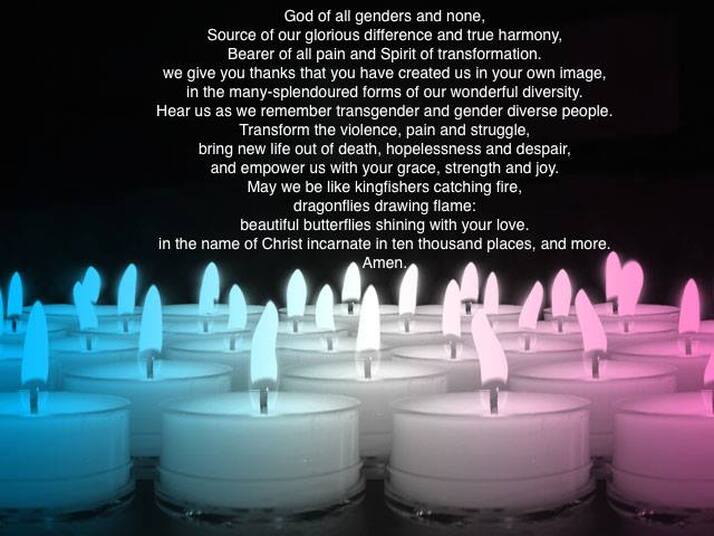 This year, the #TransDayOfVisibility falls on the date of Easter (in the Western Church), which is a happy connection for some of us, in light of what trans folk can bring to understanding resurrection, not least as transformation. One of the first prayers I wrote for a transgender occasion was this one for instance - which seems particularly appropriate in this Holy Week - drawing on one of the great priest-poet Gerard Manly Hopkins' poems. It speaks of the power of love to transform us all, enabling us truly to 'selve' (as Hopkins put it), and to flame out 'like shining from shook foil' (as Hopkins put it in another poem). So, however they keep trying to crucify some of us, may trans people so flame out and shine, this Sunday and always. 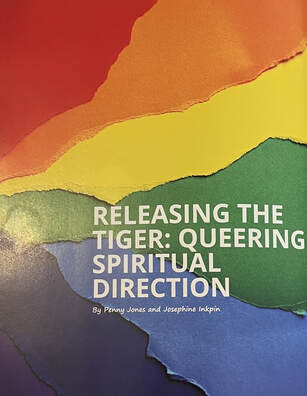 This paper (by the Revd Penny Jones and myself) was originally published in Coolamon, Issue 7 March 2023, the journal of the Australian Network for Spiritual Direction). It can be downloaded here. It explores some ways in which LGBTQ+ people contribute to our changing experience of God and reveal paths of enriching spiritual transformation. For sexual and gender identities have been at the heart of some significant recent features of both spiritual growth and conflict. From the late 1960s,1 lesbian, gay, bisexual, transgender and questioning (LGBTQ) 2, or queer3 people have formed increasingly effective social and political movements, transforming many cultural, legal and philosophical norms across the world. For many, this has also involved deliberate or unconscious spiritual expression. Progress has however been uneven, across time and space, and traditional religious formations and spiritual norms have been particular obstacles. Differing, and sometimes conflicting, conceptions of queer people and their gifts are therefore inevitably present within the spiritual direction space. Deeper exploration of these, and the underlying lived spiritual experience of queer people, is thus vital for the further flourishing of all involved. Indeed, whilst aspects may be challenging for some, the authors of this paper affirm that queer spiritual experience and understanding offers gifts which provide renewing insights for spiritual direction practice as a whole. Without unduly entering into wider controversies over sexuality and gender, this paper therefore suggests some life-giving ways to engage. These include exploring aspects of “queer virtues” identified by queer spiritual theologians and the metaphors of “coming out” and “transition” as embodiments of the paschal mystery and healthy, holy, transformation... I've been troubled lately by 'inclusive' churches saying 'LGBTIQA+ are welcome here'. Such words involve good intentions but embody the problem they seek to address. For let's think about it. Do we say 'heterosexual/cisgender people are welcome here'? Or, even when we aim to tackle enduring sexism and racism, do we say 'women are welcome here', or 'black people are welcome here'? Now thankfully this is a step beyond 'all welcome here' - that now trite phrase on so many noticeboards and church communications. Like the offensive phrase All Lives Matter, 'all welcome' tends not only to erase our vibrant differences, but pays no attention to our particular experiences of power and (degrees of) acceptance. 'LGBTIQA+ are welcome here' is also better than 'we welcome LGBTIQA+ people here', which much more starkly represents the issue: differentiating 'we' - i.e those at the heart of the church community - from 'them', the sexually and gender diverse 'outsiders'. Yet it too also reflects the dominant approach of relating to sexually and gender diverse people as 'Other'. It fails to speak of the agency of LGBTIQA+ people our/themselves. It still keeps us/them in the status of guests, more or less unwelcome. It does not grasp that sexually and gender diverse people are as much the hosts and gifts of God's love as anyone else. Perhaps it is even time to leave 'affirmation' behind, and speak more directly of celebration and transformation? After all, sexually and gender diverse people are as much hosts as guests in Jesus' 'radical hospitality'...
This photo was taken, earlier this year, from my bed of healing in a delightful unit in St Kilda (Melbourne). I had just had genital reconstruction surgery, thanks to the excellent skills of Andy Ives and his wonderful team at the nearby Masada Hospital, and I was in my first stages of recovery 'at home'. When the night's darkness began to lift, the new light of day brought this beautiful dawn. My eyes opened to the glorious gift of nature's renewal, and, with it, to the wonder of human participation in the joy of existence and work of re-creation. For across the sky, just above the treeline, floated a series of hot air balloons, beautiful expressions of fresh lightness and delight (you may just be able to spot two of them in the photo - as small circles to the left of the centre of the light, adjacent to the word alleluia). At the same time, the sunrise further gorgeously illuminated the cranes working on the building of the exciting development of the Victorian Pride Centre, visible a couple of streets away across the rooftops.
This experience was, as might be imagined, for me, a vision and harbinger of resurrection. It did not take away the struggles I was going through. The surgery itself was very successful, and there was not a subsequent shred of regret - so much the reverse, with deeper inner peace. Yet the days ahead also saw pain and discomfort, particularly with an awkward infection and a slow completion of healing due to sensitive skin (part of the joy of being a particular kind of natural redhead?!). The wider struggles of gender & sexually diverse people are also hardly over, despite such welcome living symbols of resurrection as the Pride Centre. Yet that dawn was not only a moment of special grace, but also a deep sign of hope and loving transformation, not simply for myself but for so much else about which I care. For resurrection, at least in this life and time space, is always betwixt and between... 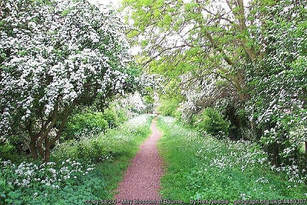 May blossom at Bourne, Lincolnshire (close to my childhood home) cc-by-sa/2.0 - © Rex Needle - geograph.org.uk/p/4480307 May blossom at Bourne, Lincolnshire (close to my childhood home) cc-by-sa/2.0 - © Rex Needle - geograph.org.uk/p/4480307 I've always loved the first of May. Maybe it is the Celtic and European blood in me, or the feminine, or the longing for justice and the appreciation of those who forged the struggle, or the family birthdays which fall this month, or simply the rising sap of life and creation itself - all topped off by those champagne breakfasts I enjoyed on this day in Oxford - but I adore it. Of course it 'works' so much better in the northern hemisphere - 'oh to be in Paris now that Spring is here', as the old song has it? (and indeed I've been blessed to be in that beautiful city of liberty in May on a number of occasions). Yet it is such a gorgeous symbolic celebration of veriditas - greening - in so many senses of the word. It rings for me, sings to me, dances in me: with joy, with hope, with transformation... One of the refreshing characteristics of contemporary global Christianity is the recovery of balance in certain aspects of Christian life and thought. Features subjugated by the dominant Western Tradition re-appear to renew and transform. These include welcome affirmations of the God of life, women, children, 'ordinary people' and their lives and work, and the importance of the heart, creation and material existence, the body of Christ as all of us and the living Spirit of God. This is notably seen in many crosses fashioned in less powerful places which do not dwell lugubriously on death, pain and sin (like so much of Western tradition, not least that shaped by the Reformation era's obsession with mortality and finitude) Instead, in the colours and contours of different contexts, we find crosses becoming signs and places of resurrection: trees of life for and by the marginalised. This does not, of course, do away with what is valuable in such Western Tradition. Yet this shift towards an ethic of natality and flourishing is a great blessing for our world, recovering much that was lost. These few pictures in this slideshow (below) are just some: reflecting the dynamism, hope and down-to-earth realities of Latin America and Indigenous Australia: including a girl's cross; a women's cross; a family cross; the body of Christ today cross; and last supper of many nations. |
AuthorJo Inkpin is an Anglican priest serving as Minister of Pitt St Uniting Church in Sydney, a trans woman, theologian & justice activist. These are some of my reflections on life, spirit, and the search for peace, justice & sustainable creation. Archives
July 2024
Categories
All
|

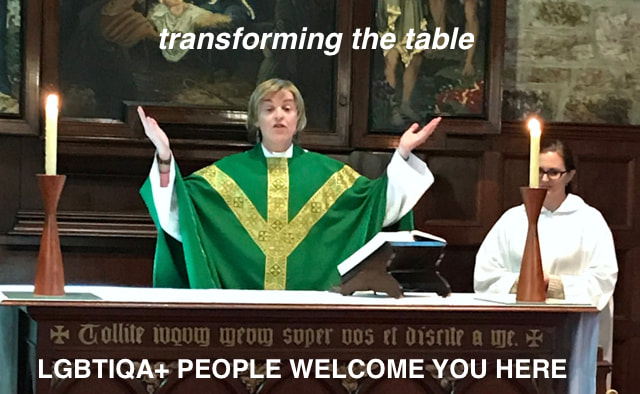
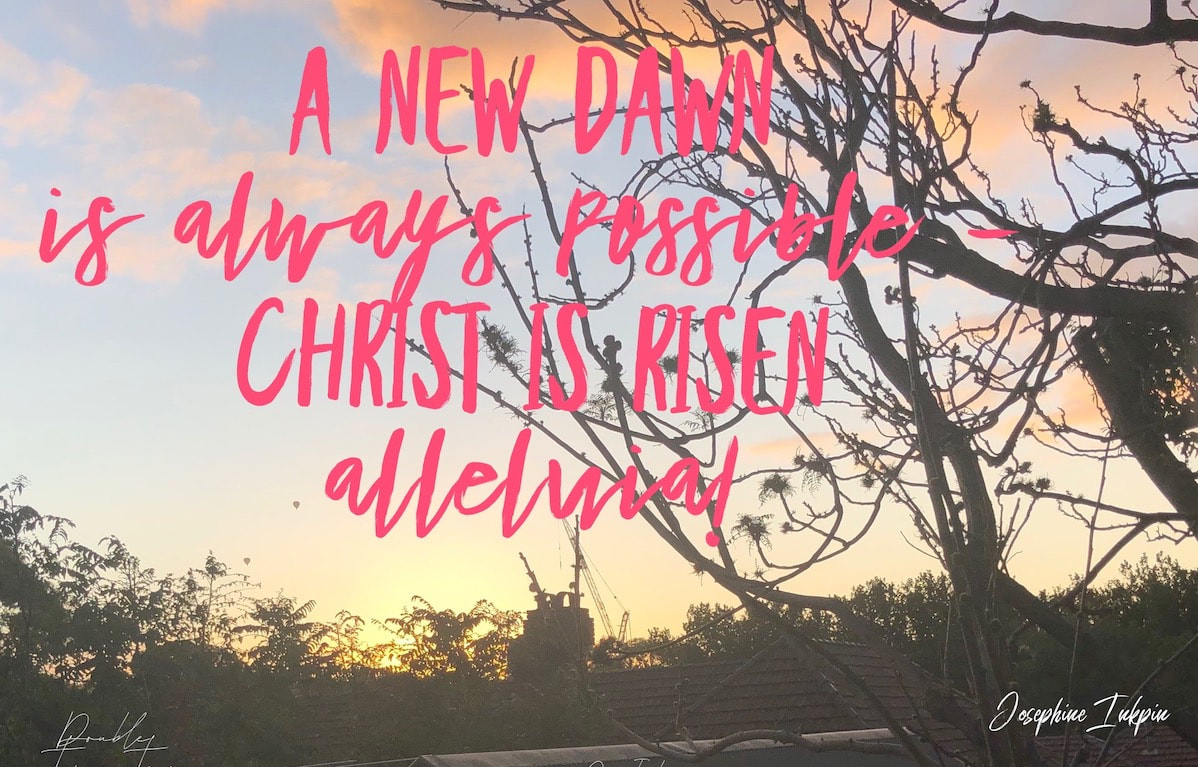
 RSS Feed
RSS Feed